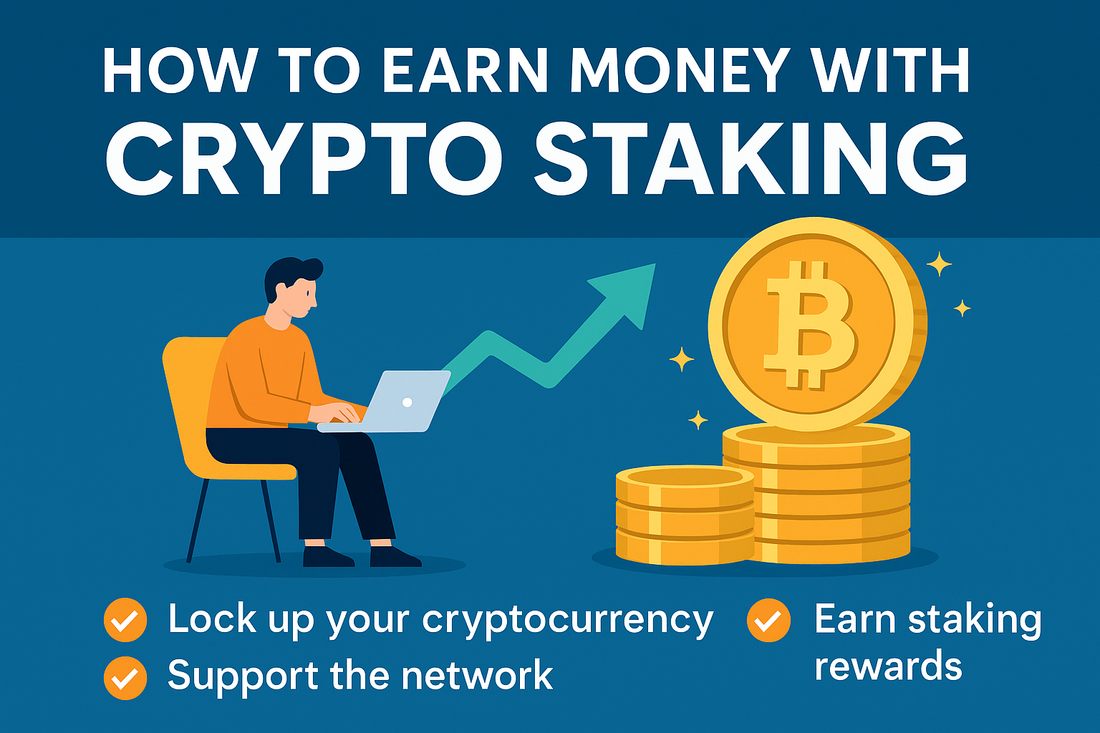
How to Earn Money with Crypto Staking in 2025
Share
Cryptocurrency isn’t just about buying and selling—it’s also about earning. One of the most popular passive income strategies in 2025 is crypto staking. Whether you're a complete beginner or already holding crypto, staking can help you earn rewards by simply locking up your coins.
Let’s break down what crypto staking is and how you can start earning money with it in 2025.
What is Crypto Staking?
Crypto staking is the process of locking your cryptocurrency in a blockchain network to support its operations—like transaction validation and securing the network. In return, you earn staking rewards, similar to earning interest in a bank account.
This is possible only on proof-of-stake (PoS) blockchains like:
-
Ethereum (ETH)
-
Solana (SOL)
-
Cardano (ADA)
-
Polkadot (DOT)
-
Avalanche (AVAX)
-
Cosmos (ATOM)
How Do You Earn Money from Staking?
When you stake crypto:
-
You lock your coins in the blockchain.
-
The network uses your stake to process transactions.
-
You earn rewards (in the same or native token) based on how much and how long you stake.
Staking APR (Annual Percentage Rate) varies between 4% to 20% or more, depending on the project.
Example:
-
Stake 10 SOL at 7% APR → Earn 0.7 SOL yearly (not counting compounding).
Best Ways to Start Staking Crypto in 2025
1. Centralized Platforms (Easy for Beginners)
Use exchanges that offer “one-click staking.”
-
Coinbase – Stake ETH, SOL, ADA, etc.
-
Binance – Offers both flexible and locked staking.
-
Kraken – Great for ETH and DOT staking.
-
Bitbuy (Canada) or CoinSpot (Australia) – For local staking options.
Pros: Easy to use, low technical skill
Cons: You don’t control private keys
2. Decentralized Wallet Staking (More Control)
Stake directly from your crypto wallet using:
-
MetaMask – For Ethereum-based staking protocols
-
Phantom – For Solana staking
-
Keplr Wallet – For Cosmos staking
Pros: Full control over funds
Cons: Requires more setup and understanding
3. Staking-as-a-Service Platforms
Companies that specialize in staking securely on your behalf:
-
Lido (ETH)
-
Rocket Pool (ETH)
-
Figment
-
Stakefish
Some of these offer liquid staking, letting you use your staked assets elsewhere while still earning.
4. Running a Validator Node (Advanced Users)
You can run your own validator node and earn higher rewards, but it’s more complex and requires:
-
High uptime
-
Technical skills
-
A minimum amount of crypto (e.g., 32 ETH for Ethereum)
Is Staking Safe?
Staking is generally safe, but here are risks to watch:
-
Slashing: You may lose part of your stake if a validator misbehaves.
-
Lock-up periods: Some coins are locked for days/weeks.
-
Market volatility: Rewards may not cover losses if prices fall.
Tip: Stick with reputable coins and platforms. Diversify your staking across multiple assets.
Top Coins for Staking in 2025
| Coin | Est. APR | Lock Period | Notes |
|---|---|---|---|
| Ethereum (ETH) | 3–5% | ~1 day unlock | Largest PoS network |
| Solana (SOL) | 6–8% | No lock | Fast, low fees |
| Cardano (ADA) | 3–6% | No lock | Long-term stability |
| Polkadot (DOT) | 10–14% | 28 days | High rewards |
| Avalanche (AVAX) | 7–10% | 14 days | Growing ecosystem |
Rates as of Q2 2025 — check your platform for updates.
Benefits of Crypto Staking
-
✅ Passive income from holding coins
-
✅ Helps secure blockchain networks
-
✅ Can compound earnings over time
-
✅ Good alternative to trading or HODLing
Final Thoughts: Is Crypto Staking Worth It in 2025?
Yes—staking is one of the most popular passive income tools in crypto right now. With high staking rewards and easier access via exchanges and apps, you don’t need to be a developer or whale to start earning.
Whether you’re staking a few hundred dollars or thousands, 2025 is a great year to start earning while you sleep.
Disclaimer:
This article is for informational purposes only and does not constitute financial advice. Cryptocurrency investments, including staking, carry risks. Always do your own research and consult a financial advisor before making investment decisions.